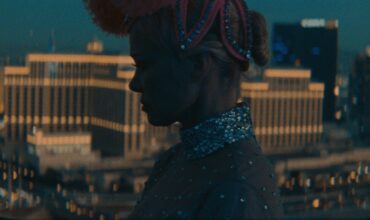The first time I remember seeing Udo Kier, he was wearing a beautiful lime green jacket and info-dumping a great deal (in a dubbed American accent) on a dance student named Susie Bannion. Little did I know the magnetic charm that this German character actor had on some of the most unique filmmakers of our time; Kier counts among his frequent collaborators the likes of Werner Herzog, Lars Von Trier, Dario Argento and Paul Morrissey. I would later recognise him in the latter’s gloriously camp 70s outings Blood for Dracula and Flesh for Frankenstein, his smooth baby face and amphibian eyes impossible to look away from. At the age of 77, he has delivered his most subtle (for Udo Kier, anyway) and personal performance in Todd Stephens’ new film Swan Song – a piece which suggests that, while you can go home, you won’t find Vivanté easily.
Pat Pitsenbarger (Kier) is a retired hairdresser who lives in white velcro sneakers and the small confines of a drab nursing home, sneaking as many More cigarettes a day as he can while intricately folding napkins to pass the time until he himself passes. He has survived a stroke and doesn’t enjoy his nurse’s attempts to prolong his life, which include sleeping in an upright bed and not filling his lungs with the smoke of yesteryear’s ciggies. When the lawyer of a deceased former client informs him of a stipulation in her will and the offer of ‘one last job’ that will pay $25,000 – hair and makeup duties for her funeral – Pat prefers that they “bury her with bad hair”. The client, a Republican diva named Rita Parker Sloan (Linda Evans – who came out of her retirement of 20 years for this small role), left him and contributed to the failure of his salon and in turn, the decline in his living standards. But the smell of a small fortune is better than that of the nursing home, and so Pat ‘escapes’ (as the orderly tells him, the door isn’t locked) and heads to his old stomping ground of Sandusky, Ohio.
While Pat’s immediate search is for a (free) ride to Sandusky, he will also need to get his hot little hands on Vivanté – a vintage hair product favoured by Rita, whose expiry likely predated (by several decades) the conception of Olaplex. He finds a lonely, dusty bottle in the window display of his former protégée and nemesis Dee Dee Dale (Jennifer Coolidge at her most restrained), grits his teeth, and ventures in. Pat’s methods and products may be prehistoric but the man knows what he’s doing and it’s the reason a crusty conservative like Rita felt the need to include him in her bossy, post-life scripture. A lovely scene later in the film sees Pat style the wig of a downtrodden drag queen using cigarette ash and alcohol, and the reveal is worthy of a spot in a Top Model compilation.
This is Stephens’ first film in ten years; his previous, Another Gay Sequel: Gays Gone Wild, did not fair so well with critics (nor audiences) but here he returns to the unbleached roots of 1998’s Edge of Seventeen, a coming-of-age, coming out story also set in his hometown of Sandusky. The character of Pat Pitsenbarger is based heavily on someone Stephens encountered in his youth – a real-life hairdresser who served as his first introduction to what it is to be queer. Udo Kier, an openly gay man who never felt drawn to the safety of the closet, was the lead Stephens waited a year and a half to find. The pair worked closely together while shooting the film in sequence, allowing Kier to really walk in the shoes of the enigmatic character that influenced the director’s life so much. It’s this dedication to the personal that makes Swan Song work despite some of its flaws.
Mr. Pat – traffic stopper
Pat’s beloved Mores (favoured by the real Pat) are considered a niche brand for ladies. When first introduced they were higher in tar and nicotine than many other cigarettes – one could describe them as ‘a bit much’. The same has historically been true of Pat, who overflows with audacity and proud flamboyance. Appreciated only in secret by his alleged best friend Rita, Pat’s influence never stretched to receiving an invite to her lavish parties. But he didn’t leave the town as friendless as he thought.
Since Pat doesn’t get the 25k until the job is done and the estate’s finances are sorted, he must get to his destination on the kindness of others. Luckily for him, everyone he meets seems completely smitten with his personality. The deeply Christian driver with whom he hitchhikes to Sundasky (who we assume doesn’t accept his payment of ‘Free Beauty Tips’) holds his hand sweetly as he tells her that his gay lover died of AIDS. The black ladies whose salon he enters in a search to find Vivanté respond with uproarious laughter at his cheeky question about their sunscreen stock, instead bequeathing him a sunhat previously owned by the salon’s departed matriarch. An op-shop employee straight up gives him an outfit (a vintage suit in that same gorgeous lime green) because she remembers the hairstyle he gave her 20 years earlier and he remembers the name of her son. Pat has not changed in the slightest over the years but thankfully, the town has updated its views.
Despite spending only a short time with Pat, I fell head over heels. He’s a man who wears costume rings on every single finger and spends his last $20 on a $15 glass of Pinot Gris and a tip for the waiter, then shoplifts the beauty products he needs. Kier’s German accent only adds to the endearing quality of this gem of a person, so that when he spits out sassy zingers – “In five minutes I’m supposed to make a dead bitch look human” – the spirit is hilarious rather than nasty. The memories he envisions of David (his lover) are heartbreaking and in his brief monologues, I felt as though I was listening to a real person standing in front of me, lamenting the friendships whose ends hurt the most and yearning to be with the one who accepted him wholly.
Swan Song wraps itself up a little too neatly, over-simplifying the message of forgiving toxicity in people purely because they died or because ‘it was a different time’, but Kier’s magnificent performance, and the care that Stephens has put into crafting a story of resonance around an influential figure from his own childhood, make the film a genuinely moving experience and a love letter to the queer folk who paved the way. 7.5/10
Swan Song comes out December 26.


